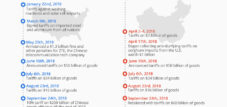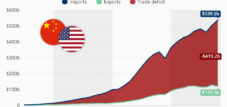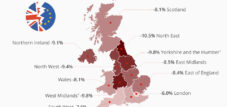TikTok saved by Oracle? US-China deal: A comprehensive overview
Xpert pre-release
Language selection 📢
Published on: September 16, 2025 / Updated on: September 16, 2025 – Author: Konrad Wolfenstein
The Oracle Plan: How a US corporation will control TikTok's future in America
### A sigh of relief for 170 million users: This is what the new TikTok pact really means ### TikTok's core remains: This is how the Chinese algorithm is now supposed to be made safe in the USA ###
More than just an app: What the TikTok deal reveals about the new balance of power between the US and China
In a months-long struggle that kept the digital world on edge, the US and China have reached a decisive breakthrough: A comprehensive framework deal is intended to avert the impending ban of the popular video app TikTok in the United States. The agreement marks the preliminary climax of a geopolitical thriller characterized by national security concerns, the protection of 170 million American users' data, and a remarkable about-face by US President Donald Trump.
Instead of a forced sale, an innovative partnership solution is now emerging, built on the US technology company Oracle as a trusted partner. Oracle will not only manage US users' data but also oversee the valuable and highly controversial recommendation algorithm of TikTok's parent company ByteDance.
This compromise deftly navigates between American security requirements and China's desire to preserve its technological sovereignty. The agreement is more than just saving a social media app; it sets a potential precedent for the future of global technology platforms and could have a lasting impact on the strained trade relations between the two superpowers.
What led to the dispute over TikTok?
The conflict over TikTok between the US and China has evolved into one of the most significant digital policy issues for several years. TikTok is owned by ByteDance, a Chinese technology company that operates the popular short video app. The US government's concerns focus on two main aspects: the Chinese government's potential access to user data of US citizens and the potential for political influence via the platform.
The concerns of US authorities are not unfounded. Chinese laws require companies to transfer data to the government upon request. This creates a structural risk that goes beyond the normal privacy concerns for social media platforms. Additionally, TikTok's algorithm, which determines what content users see, is causing concern for US lawmakers. They fear it could be used to manipulate public opinion.
The problem gained urgency as TikTok grew exponentially in the US. With now 170 million monthly active users in the United States, the platform has become a central communication medium, especially for young people. One-third of young Americans get their news from TikTok, highlighting the potential reach of potential influence.
What legal basis did the US create for a TikTok ban?
The legal framework for a potential TikTok ban was created during Joe Biden's presidency. In April 2024, Biden signed the Protecting Americans from Foreign Adversary Controlled Applications Act. This legislation was part of a broader foreign aid package for Israel and Ukraine and passed both the House of Representatives and the Senate with broad bipartisan support.
The law requires ByteDance to sell its stake in TikTok within 270 days, otherwise the platform faces a complete ban in the US. Specifically, this means TikTok would have to be removed from Apple's and Google's app stores and would no longer be able to use hosting services. Without technical updates, the app would gradually become unusable for existing users.
The original deadline for the divestment was January 19, 2025. However, the law provided for an extension: the president could extend the deadline by another 90 days if substantial progress toward a divestment was evident. The U.S. Supreme Court upheld the constitutionality of this law in January 2025 and unanimously dismissed TikTok's lawsuit.
How did Trump's position on TikTok evolve?
Donald Trump's attitude toward TikTok underwent a remarkable transformation. During his first term in office from 2017 to 2021, Trump attempted to force TikTok to sell by forcing it to ban the company, but failed in court. At the time, he viewed the app as a national security threat and attempted to halt its operations in the United States.
By the time Trump re-took the presidency in 2025, his perspective had fundamentally changed. He recognized that TikTok had helped him significantly in the 2024 election campaign, especially in mobilizing young voters. His personal TikTok account gained 15 million followers, underscoring the platform's political importance. This experience led to a strategic rethink: Instead of banning the app, Trump wanted to "save" it for young Americans.
Since taking office, Trump has extended the sales deadline three times. At the same time, his administration even opened an official TikTok account, symbolically underscoring the change in stance. Trump repeatedly emphasized that banning the app could anger his young supporters, which would be politically counterproductive.
What are the details of the current Framework deal?
On September 15, 2025, both sides announced a breakthrough in the negotiations. US Treasury Secretary Scott Bessent declared after trade talks in Madrid: "We have a framework for a TikTok deal." President Trump hinted at an agreement on his platform, Truth Social, without mentioning TikTok by name. He wrote of a "certain" company that young people were "very desperate to save."
The Chinese side also confirmed the agreement. Li Chenggang, China's trade representative, spoke of a "basic framework consensus for the reasonable resolution of TikTok-related issues." Wang Jingtao, deputy director of the Chinese Cyberspace Administration, indicated that the agreement could include the licensing of the algorithm and other intellectual property rights.
A crucial point of the agreement is that TikTok's US version may continue to use ByteDance's algorithm. This was previously a critical point of contention, as China had classified the export of its recommendation algorithms as strategic technology. The deal stipulates that an American partner—presumably Oracle—will assume data management and security monitoring, while ByteDance retains certain ownership rights.
What role does Oracle play in the negotiations?
Oracle, the American technology company led by Larry Ellison, is considered the most likely American buyer or partner for TikTok. Ellison, who at one point even surpassed Elon Musk as the world's richest person, maintains close ties to the Trump administration and is a regular guest at Mar-a-Lago.
The relationship between Oracle and TikTok dates back several years. Since 2022, TikTok has been storing US user data on Oracle servers as part of "Project Texas." This $1.5 billion restructuring program was intended to gain the trust of the US government and users by moving all US user data to US servers.
Project Texas created an American subsidiary called "US Data Security" (USDS), run by American employees. Oracle took over not only data storage but also the monitoring and review of TikTok's source code. The company acts as a trusted technology partner to ensure that Chinese authorities do not gain access to American user data.
Why did the breakthrough in the negotiations happen now?
The timing of the breakthrough is no coincidence. Finance Minister Bessent explained that the threat of an actual blocking of TikTok persuaded the Chinese negotiators to relent. Trump made it clear that he was willing to actually block TikTok and that national security would not be sacrificed for a deal.
The negotiations took place in Madrid in the context of broader trade talks between the US and China. Both countries had an interest in defusing the escalating trade disputes. Parallel to the TikTok talks, China announced that the American chip manufacturer Nvidia had violated Chinese antitrust laws, which was seen as retaliation for American technology restrictions.
Another factor was the political reality in the US. With 170 million American users, TikTok had become too large to simply ban without risking massive political backlash. Young voters, in particular, a key target group for both parties, used the platform intensively. A ban would have alienated this constituency and would therefore have been politically difficult to implement.
What technical and security aspects does the deal cover?
The agreed framework addresses the US's key security concerns without destroying TikTok's core functionality. A critical issue is how to handle TikTok's recommendation algorithm, considered ByteDance's most valuable asset. Previous negotiations often failed because China refused to transfer this technology, as it fell under Chinese export restrictions.
The new agreement appears to have struck an innovative compromise: TikTok will continue to use the Chinese algorithm, but under strict American supervision. Oracle will act as a custodian, monitoring both the data and the algorithm's operations. This means American authorities will have insight into the system's workings without China having to completely surrender its intellectual property.
The deal builds on the experience of Project Texas, which had already proven that partial separation is technically feasible. Since 2022, 100 percent of American user traffic has been routed through Oracle-controlled infrastructure. The user algorithms for American users already run on Oracle's cloud infrastructure, providing the technical foundation for the expanded solution.
A new dimension of digital transformation with 'Managed AI' (Artificial Intelligence) - Platform & B2B Solution | Xpert Consulting

A new dimension of digital transformation with 'Managed AI' (Artificial Intelligence) – Platform & B2B Solution | Xpert Consulting - Image: Xpert.Digital
Here you will learn how your company can implement customized AI solutions quickly, securely, and without high entry barriers.
A Managed AI Platform is your all-round, worry-free package for artificial intelligence. Instead of dealing with complex technology, expensive infrastructure, and lengthy development processes, you receive a turnkey solution tailored to your needs from a specialized partner – often within a few days.
The key benefits at a glance:
⚡ Fast implementation: From idea to operational application in days, not months. We deliver practical solutions that create immediate value.
🔒 Maximum data security: Your sensitive data remains with you. We guarantee secure and compliant processing without sharing data with third parties.
💸 No financial risk: You only pay for results. High upfront investments in hardware, software, or personnel are completely eliminated.
🎯 Focus on your core business: Concentrate on what you do best. We handle the entire technical implementation, operation, and maintenance of your AI solution.
📈 Future-proof & Scalable: Your AI grows with you. We ensure ongoing optimization and scalability, and flexibly adapt the models to new requirements.
More about it here:
TikTok deal: Billion-dollar game, shift in power, unknown risks – How Oracle is becoming a key player in tech security with TikTok
What are the economic implications of the TikTok acquisition?
The financial aspects of the TikTok deal are significant. TikTok generated approximately $10 billion in revenue in the US in 2024, with total global revenue estimated at between $20 and $26 billion. The American market is the most profitable, as social media platforms generate significantly higher advertising revenue per user in the US than in other regions.
ByteDance itself is valued at approximately $300 billion, making it the second-most valuable private technology company in the world. A significant portion of this valuation depends on its performance in the US, where TikTok has its most valuable user base. Losing the American market would have hit ByteDance hard, increasing the negotiating pressure on the Chinese side.
For Oracle, the deal represents a significant business opportunity. The company saw its shares increase by over three percent following the announcement of the agreement. Oracle not only benefits from cloud hosting fees but also positions itself as a leading provider of data-sensitive applications in the field of national security. The partnership with TikTok demonstrates Oracle's capabilities in handling complex geopolitical requirements.
How do different interest groups react to the deal?
Reactions to the announced deal have been mixed, reflecting the complex conflicts of interest. Young TikTok users, who had feared an impending ban, largely reacted with relief. Their emotional farewell videos and protests in early 2025, when TikTok was briefly blocked, had increased political pressure on the government.
Security experts and parts of Congress remain skeptical. They doubt whether a solution that continues to give ByteDance a role can address fundamental security concerns. Critics argue that as long as Chinese companies have influence over the algorithm, the risk of covert interference remains.
The technology industry is watching the deal with great interest, as it could set a precedent for how foreign tech investments are handled. Other Chinese technology companies hope that a successful TikTok solution will open up new opportunities for them in the US. At the same time, American technology companies fear that the deal could give Chinese competitors an advantage.
What legal hurdles still exist?
Despite the announced agreement between the governments, significant legal hurdles still need to be overcome. Congress, which passed the original ban legislation with a large majority, may have to approve the final agreement. Some Democratic lawmakers have already announced they will carefully review any deal to ensure it meets legal requirements.
The problem lies in the interpretation of the Protecting Americans from Foreign Adversary Controlled Applications Act. The law requires a complete divestiture of ByteDance, which is difficult to reconcile with a solution that would continue to grant the Chinese company ownership rights. Legal experts are controversially debating whether the proposed structure meets the legal requirements.
Trump has already extended the sales deadline three times, but the legal basis for further extensions is disputed. So far, there have been no legal challenges to these extensions, but that could change if the final deal doesn't meet Congress's expectations. While Attorney General Pam Bondi has assured companies like Apple and Google that the Department of Justice will not pursue claims for potential violations, this commitment could be invalidated if the political climate changes.
What does the deal mean for global technology policy?
The TikTok deal has implications far beyond bilateral relations between the US and China. It establishes a new model for dealing with cross-border technology platforms that other countries may adopt. The solution demonstrates that even in the face of deep geopolitical tensions, pragmatic compromises are possible that reconcile economic and security interests.
For the European Union, which has its own concerns about Chinese technology companies, the deal could serve as a blueprint. The EU is working on similar regulations for foreign technology investments and could use the American solution as a model for its own arrangements. In particular, Oracle's role as a trusted intermediary could be replicated in other jurisdictions.
The deal also impacts broader trade talks between the US and China. A successful conflict resolution in such a symbolic area as TikTok could benefit other areas of bilateral relations. Finance Minister Bessent has already announced further rounds of negotiations in the coming weeks, suggesting a possible easing of trade relations.
What technical challenges does the implementation entail?
The practical implementation of the TikTok deal entails considerable technical complexity. Separating algorithm operations and data flows between different jurisdictions requires sophisticated technical solutions. Oracle must ensure that American user data never reaches Chinese servers, while simultaneously maintaining the app's functionality.
TikTok's global nature poses a particular challenge. American users regularly interact with content from users in other countries, requiring data flows across borders. The new architecture must enable these interactions without violating security requirements. This could mean developing different versions of the app for different markets.
Monitoring the algorithm presents another technical challenge. Oracle engineers must be able to understand and review TikTok's source code without compromising trade secrets. This requires new forms of technical collaboration between American and Chinese engineers under strict regulatory oversight.
How does the deal affect the future of social media?
The TikTok deal could be groundbreaking for the future of global social media platforms. It demonstrates that even in the face of fundamental geopolitical tensions, solutions can be found that address both security concerns and user needs. This could establish a new paradigm for regulating cross-border technology platforms.
The deal sets important precedents for other social media companies. Chinese platforms like WeChat or other ByteDance products could seek similar arrangements with Western governments. At the same time, American and European technology companies in China could face similar requirements to entrust their operations to local partners.
The deal also demonstrates the growing importance of "data sovereignty"—the idea that countries should have control over their citizens' data. These concepts are likely to shape the future of international technology policy and could lead to the fragmentation of the global internet into regional blocs. TikTok is becoming a test case for whether such fragmentation can be avoided without sacrificing security interests.
What long-term effects can be expected?
The long-term consequences of the TikTok deal will only become fully apparent over the years. If the solution is successful and both addresses security concerns and keeps the platform functioning, it could serve as a model for similar conflicts. This could lead to the development of new international standards for cross-border technology platforms.
For ByteDance, the deal represents a fundamental change in its business model. The company must learn to operate in a more regulated and monitored environment. This could impact its ability to innovate rapidly, but could also open up new business opportunities in other regulated markets. The lessons learned from the American deal could help ByteDance overcome similar challenges in other countries.
The global technology industry is watching the TikTok deal as an indicator of the future direction of tech geopolitics. A successful deal could usher in a period of détente in US-China technology relations. However, if it fails or leads to persistent security concerns, it could further escalate technology tensions and encourage other countries to take even more restrictive measures against foreign technology companies.
EU/DE Data Security | Integration of an independent and cross-data source AI platform for all business needs
Ki-Gamechanger: The most flexible AI platform-tailor-made solutions that reduce costs, improve their decisions and increase efficiency
Independent AI platform: Integrates all relevant company data sources
- Fast AI integration: tailor-made AI solutions for companies in hours or days instead of months
- Flexible infrastructure: cloud-based or hosting in your own data center (Germany, Europe, free choice of location)
- Highest data security: Use in law firms is the safe evidence
- Use across a wide variety of company data sources
- Choice of your own or various AI models (DE, EU, USA, CN)
More about it here:
We are there for you - advice - planning - implementation - project management
☑️ SME support in strategy, consulting, planning and implementation
☑️ Creation or realignment of the digital strategy and digitalization
☑️ Expansion and optimization of international sales processes
☑️ Global & Digital B2B trading platforms
☑️ Pioneer Business Development
I would be happy to serve as your personal advisor.
You can contact me by filling out the contact form below or simply call me on +49 89 89 674 804 (Munich) .
I'm looking forward to our joint project.
Xpert.Digital - Konrad Wolfenstein
Xpert.Digital is a hub for industry with a focus on digitalization, mechanical engineering, logistics/intralogistics and photovoltaics.
With our 360° business development solution, we support well-known companies from new business to after sales.
Market intelligence, smarketing, marketing automation, content development, PR, mail campaigns, personalized social media and lead nurturing are part of our digital tools.
You can find out more at: www.xpert.digital - www.xpert.solar - www.xpert.plus



























